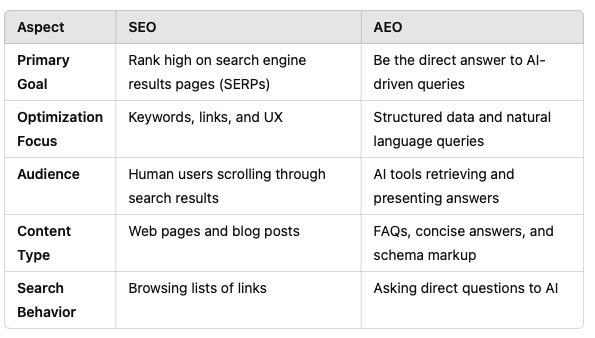For years, Search Engine Optimization (SEO) has been the foundation of digital marketing strategies, helping businesses improve their online visibility and attract traffic from search engines like Google and Bing. But as artificial intelligence (AI) continues to transform the way people search for and access information, a new form of optimization has emerged: Ask Engine Optimization (AEO). While SEO focuses on ranking websites, AEO focuses on ensuring businesses can answer user queries directly within AI-powered platforms. Let’s explore how these two strategies differ and why AEO is becoming essential for businesses aiming to stay competitive in the AI-driven world.
SEO is all about optimizing a website’s structure, content, and backlinks to achieve higher rankings on search engine results pages (SERPs). It’s a strategy tailored for human users who scroll through a list of links and choose the one that best matches their intent. SEO encompasses several key components:
– Keyword Optimization: Researching and targeting specific terms that potential customers use in their searches.
– On-Page SEO: Enhancing content, meta descriptions, headers, and internal links for better indexing by search engines.
– Off-Page SEO: Building backlinks from authoritative sites to increase domain authority.
– User Experience (UX): Ensuring websites load quickly, are mobile-friendly, and have intuitive navigation.
SEO remains effective for driving organic traffic and increasing brand visibility, but its relevance is being challenged by AI-driven search.
Ask Engine Optimization (AEO) takes a different approach. Instead of optimizing for a list of search results, AEO aims to ensure that your business is the answer provided by AI-powered tools like ChatGPT, Google Bard, Alexa, or Siri. These systems are designed to understand natural language queries and provide direct answers rather than directing users to a webpage.
AEO focuses on:
– Conversational Queries: Optimizing for how people naturally ask questions, often in long-tail keywords. For example, instead of targeting “best Italian restaurant” (SEO), AEO targets “Where can I find the best Italian restaurant near me?”
– Structured Data: Implementing schema markup to help AI systems interpret content accurately.
– Rich Answers: Creating content that provides concise, authoritative, and direct answers to common questions.
– AI Compatibility: Ensuring content is accessible and retrievable by AI platforms.
While SEO and AEO share some overlapping principles, their focus and execution are distinctly different:

As AI continues to influence search behavior, AEO is becoming a critical strategy for businesses to remain visible and competitive. Here’s why:
1. AI is Changing How People Search
With the rise of AI-powered platforms like ChatGPT, Google Bard, and conversational assistants, users increasingly rely on AI for direct answers instead of traditional search engines. These tools summarize information, provide recommendations, and even generate content—all without the need for users to click on a link.
2. Voice Search is Growing
Voice-enabled devices like Alexa, Siri, and Google Assistant are changing how people search. By 2024, an estimated 71% of consumers will use voice assistants for quick answers. AEO ensures your content is optimized for conversational, spoken queries.
3. Direct Answers Improve Engagement
AI tools prioritize content that directly addresses user queries. Businesses that adopt AEO strategies can position themselves as the authoritative answer, boosting customer trust and engagement.
4. AI Understands Structured Data
AI systems rely on structured data—such as schema markup—to interpret and retrieve relevant information. AEO ensures your business data is organized and accessible, increasing the likelihood of being featured as an answer.
To succeed in the AI-driven search landscape, businesses should adopt the following AEO strategies:
1. Focus on FAQs: Identify the most common questions your audience asks and provide clear, concise answers.
2. Use Schema Markup: Implement structured data on your website to help AI understand your content.
3. Optimize for Voice Search: Target conversational, long-tail keywords that align with spoken queries.
4. Create Rich Content: Develop high-quality content that directly answers user questions and provides additional value.
5. Test with AI Tools: Regularly test how your content performs on AI platforms like ChatGPT, Google Bard, and voice assistants.
6. Monitor and Adapt: As AI systems evolve, update your content and strategies to stay ahead of the curve.
The rise of AI is reshaping how people find and interact with information. While SEO remains important, AEO is emerging as the next critical step for businesses that want to compete in the AI-driven world. By focusing on being the *answer* rather than just appearing in search results, businesses can secure their place in the future of search.
Finding a partner like Interact can make all the difference in successfully navigating this shift. With expertise in AEO strategy, dataset building, schema creation, and optimization, Interact helps businesses position themselves as the authoritative answer for AI-driven queries. By working with Interact, you can ensure your content is optimized not just for today’s search engines, but for the evolving AI landscape of tomorrow.
Are you ready to embrace the shift to AEO? The time to optimize for the world of AI is now. The time to optimize for the world of AI is now.